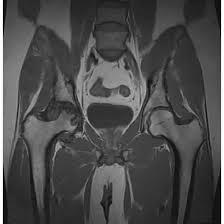Fill out form to enquire now
MRI For Sinogram
Medintu has collaborated with the best pathology laboratories that are NABL and NABH certified and follow ISO safety guidelines to provide the best MRI For Sinogram at an affordable price for needy individuals. MRI for sinogram is a specialized imaging technique used to assess the health of your sinuses and surrounding structures. Unlike traditional X-rays or CT scans, which primarily focus on bones, MRI provides high-resolution images of soft tissues such as mucous membranes, blood vessels, and muscles. This makes it especially effective for diagnosing a variety of sinus-related conditions, including chronic sinusitis, nasal polyps, tumors, infections, and structural abnormalities. The procedure involves the use of a magnetic field and radio waves to create detailed images of the sinuses, offering a non-invasive way to visualize internal sinus structures without the use of ionizing radiation. This is particularly beneficial for patients who require repeated imaging or who are sensitive to radiation.
To schedule an appointment for an MRI For Sinogram, simply contact Medintu or call our customer care at +919100907036 or +919100907622 for more details and queries.
How MRI for Sinogram Works?
MRI for sinogram is a specialized imaging technique used to assess the sinuses and surrounding areas. Here’s a step-by-step overview of how the procedure works:
- Magnetic Field and Radio Waves
MRI (Magnetic Resonance Imaging) works by using a powerful magnetic field and radio waves to generate detailed images of the body’s internal structures.
The magnetic field temporarily aligns the hydrogen atoms in your body, and radio waves are then used to disrupt that alignment. As the hydrogen atoms return to their original state, they emit signals that the MRI machine detects and converts into images.
- Imaging the Sinuses
For a sinogram MRI, the focus is on the sinuses and the surrounding soft tissues, including the nasal cavity and areas like the frontal and maxillary sinuses.
The patient is positioned comfortably on an MRI table, with the head positioned inside the MRI machine’s scanner. The machine creates detailed, cross-sectional images (slices) of the sinuses and surrounding areas.
- Use of Contrast Agent (if necessary)
In some cases, a contrast agent called gadolinium may be injected into the bloodstream to improve the clarity of the images.
The contrast helps to enhance the visibility of blood vessels, tumors, or areas with abnormal tissue, providing more detailed images of any issues affecting the sinuses or nasal passages.
- Image Creation and Analysis
Once the images are captured, the MRI machine processes them to create detailed scans of the sinuses, highlighting areas of abnormal tissue, inflammation, or blockages.
These images can help identify problems such as sinusitis, nasal polyps, cysts, or tumors that may be affecting the sinuses or nasal passages.
- Advantages of MRI for Sinogram
Soft Tissue Imaging: MRI is particularly effective for imaging soft tissues, like the mucous lining of the sinuses and the brain. Unlike CT scans or X-rays, MRI does not rely on radiation, making it a safer option for those requiring frequent imaging.
No Ionizing Radiation: MRI does not use X-rays, which makes it a preferred option for many patients, especially those who are pregnant or require repeated imaging.
High-Resolution Images: MRI provides high-resolution images, enabling precise detection of abnormalities such as tissue inflammation, nasal polyps, or tumors, which may be missed by other imaging methods.
Why MRI for Sinogram is Used?
MRI for sinogram is an important diagnostic tool used to assess the health and condition of the sinuses and surrounding structures. Here are the key reasons why MRI for sinogram is used:
- Diagnosing Chronic Sinus Conditions
Chronic Sinusitis: MRI is highly effective for diagnosing chronic sinusitis, a condition where the sinuses become inflamed over a long period. MRI helps identify the extent of the inflammation and can show the thickening of sinus membranes or blockage of sinus passages.
- Evaluating Nasal Polyps and Cysts
Nasal Polyps: MRI is useful for visualizing nasal polyps, which are non-cancerous growths that can develop in the nasal passages and sinuses, leading to blockage and sinus infections. MRI provides detailed images that show the size, location, and potential impact of polyps on the surrounding structures.
- Identifying Sinus Tumors
Benign and Malignant Tumors: MRI for sinogram is an effective tool for identifying both benign and malignant tumors in the sinuses. MRI provides high-resolution images that can differentiate between various types of tissue and help identify abnormal growths or masses, which may be challenging to detect with other imaging techniques.
- Assessing Structural Abnormalities
Deviated Septum: A deviated septum, where the wall between the nostrils is shifted to one side, can be identified and assessed using MRI. MRI provides a detailed view of the nasal passages and can help doctors plan for corrective procedures.
- Evaluating Sinus Infections
Acute and Chronic Infections: MRI for sinogram can be used to evaluate both acute and chronic sinus infections. It helps doctors understand the severity of the infection and whether it has spread beyond the sinuses to surrounding tissues, such as the brain or eye socket.
Benefits of MRI for Sinogram
MRI for sinogram offers several distinct advantages, making it a highly valuable tool for diagnosing and evaluating conditions affecting the sinuses and surrounding structures. Here are the key benefits of using MRI for sinogram:
- Non-Invasive and Safe
No Ionizing Radiation: Unlike CT scans and X-rays, MRI does not use ionizing radiation, making it a safer imaging option, especially for individuals who need frequent imaging or for those who are pregnant.
Non-Invasive: MRI is a non-invasive procedure, meaning it doesn’t require any incisions or biopsies, minimizing risks and recovery time for patients.
- Detailed Soft Tissue Imaging
High-Resolution Images: MRI provides high-resolution, detailed images of soft tissues, which are often difficult to capture with other imaging methods. This is particularly useful for visualizing the mucosal linings of the sinuses, blood vessels, and other soft tissue structures in the nasal passages and surrounding areas.
- Effective for Diagnosing Complex Conditions
Sinus Infections and Chronic Sinusitis: MRI is highly effective for diagnosing chronic sinusitis and acute sinus infections by showing the degree of inflammation, blockage, and any tissue changes within the sinuses. It helps determine the severity and extent of the condition.
- No Need for Contrast in Many Cases
Contrast-Free Imaging: In many cases, MRI for a sinogram can provide sufficient detail without the need for a contrast agent. This reduces the risk of allergic reactions or other side effects, making the procedure safer and more comfortable for the patient.
- Comprehensive Evaluation of Soft Tissues and Structures
Evaluation of Surrounding Tissues: MRI does more than just assess the sinuses. It can also evaluate nearby structures such as the brain, eyes, and facial bones, which may be affected by or contribute to sinus problems. This comprehensive view helps doctors better understand the full scope of a patient’s condition.
Conditions Diagnosed with MRI for Sinogram
MRI for sinogram is a highly effective tool for diagnosing and evaluating various conditions affecting the sinuses and surrounding areas. Here are the main conditions that can be diagnosed with MRI for sinogram:
- Chronic Sinusitis
Description: Chronic sinusitis is the long-term inflammation of the sinuses, often caused by persistent infections or allergies. This condition leads to symptoms such as facial pain, congestion, and nasal discharge.
- Acute Sinus Infections
Description: Acute sinusitis is a short-term infection of the sinuses, typically caused by a bacterial or viral infection. It results in swelling and irritation of the sinus cavities, leading to pain, pressure, and nasal congestion.
- Nasal Polyps
Description: Nasal polyps are non-cancerous, soft growths that form in the nasal passages or sinuses. They are often associated with chronic inflammation, allergies, or asthma and can obstruct airflow, causing breathing difficulties and sinus issues.
- Sinus Tumors (Benign and Malignant)
Description: Tumors in the sinuses can be benign (non-cancerous) or malignant (cancerous). These tumors may cause symptoms like persistent sinus infections, facial pain, headaches, or visual disturbances.
- Sinus Cysts
Description: Sinus cysts are fluid-filled sacs that can develop within the sinuses. These cysts may not cause symptoms, but if they become large or infected, they can lead to sinus congestion, pain, or difficulty breathing through the nose.
- Sinus Blockages and Obstructions
Description: Blockages or obstructions in the sinuses can result from conditions like chronic sinusitis, polyps, or anatomical abnormalities (e.g., deviated septum). These obstructions can impair sinus drainage and contribute to recurrent infections.
When is MRI for a Sinogram Recommended?
MRI for a sinogram is typically recommended when doctors need to evaluate sinus conditions that cannot be fully assessed with other imaging techniques, or when a more detailed and comprehensive view of the sinuses and surrounding structures is needed. Here are the main scenarios when an MRI for sinogram might be recommended:
- Chronic Sinusitis or Persistent Sinus Infections
When: If you have chronic sinusitis (lasting more than 12 weeks) or recurrent sinus infections that don’t respond to standard treatments, an MRI may be recommended.
- Nasal Polyps
When: If you have symptoms like chronic nasal congestion, sinus pressure, or difficulty breathing through the nose, and nasal polyps are suspected, an MRI may be recommended.
- Sinus Tumors (Benign or Malignant)
When: MRI is often recommended if a sinus tumor is suspected, particularly if symptoms like unexplained facial pain, swelling, or visual disturbances persist.
- Unexplained Facial Pain or Headaches
When: If you are experiencing persistent or unexplained facial pain, pressure, or headaches, and sinus issues are suspected, an MRI for a sinogram may be recommended.
- Evaluation of Sinus Blockages or Obstructions
When: If you have difficulty breathing through your nose or experience constant nasal congestion despite treatments, an MRI may be recommended.
- Nasal or Sinus Surgery Planning
When: If you are scheduled for sinus surgery (e.g., sinus polypectomy or sinus surgery for chronic sinusitis), an MRI may be recommended before the procedure.
- Test Type: MRI For Sinogram
- Preparation:
- Wear a loose-fitting cloth
- Fasting required
- Carry Your ID Proof
- Prescription is mandatory for patients with a doctor’s sign, stamp, with DMC/HMC number; as per PC-PNDT Act
- Reports Time: With in 4-6 hours
- Test Price: Rs.4500
How can I book an appointment for an MRI For Sinogram through Medintu?
To schedule an appointment for an MRI For Sinogram, simply contact Medintu or call our customer care at +919100907036 or +919100907622 for more details and queries.
What is an MRI for a sinogram?
An MRI for sinogram is a type of magnetic resonance imaging specifically designed to assess the sinuses and surrounding areas. It provides detailed images of the soft tissues, bones, and structures of the nasal passages, helping doctors diagnose conditions like sinusitis, nasal polyps, tumors, or structural abnormalities.
Does an MRI for a sinogram hurt?
No, an MRI for a sinogram is a completely non-invasive procedure and does not cause pain. You will be asked to lie still inside the MRI machine while it captures detailed images of your sinuses. Some people may feel discomfort from having to stay in the same position for a period of time, but the procedure itself is painless.
Is MRI for sinogram safe?
Yes, MRI is a safe procedure. Unlike CT scans or X-rays, MRI uses magnetic fields and radio waves, not radiation, making it a safer option for imaging. However, people with certain medical implants or devices (such as pacemakers) should inform their doctor before the scan, as MRI may not be safe for them.
Do I need to prepare for an MRI for a sinogram?
In most cases, no special preparation is needed for an MRI of the sinuses. You may be asked to avoid eating or drinking for a few hours before the procedure, especially if a contrast agent is being used. Be sure to wear comfortable, loose-fitting clothes and remove any metal items (such as jewelry) before the scan.
How long does an MRI for a sinogram take?
The MRI scan typically takes about 30 to 45 minutes. However, the total time at the imaging facility may be longer, as it includes time for preparation and post-procedure instructions.
Will I need contrast for the MRI of my sinuses?
Not always. In many cases, an MRI of the sinuses can be done without contrast. However, in certain situations, a contrast agent (such as gadolinium) may be used to enhance the images and provide more detailed information, especially if tumors or other complex conditions are suspected.
How is MRI different from a CT scan for sinus problems?
Both MRI and CT scans are used to assess sinus issues, but they have different advantages. MRI provides better detail of soft tissues, such as the mucosal lining of the sinuses, and is more effective in visualizing things like inflammation, tumors, and nasal polyps. CT scans, on the other hand, are typically quicker and better at detecting bony abnormalities or fractures.
Can MRI for sinogram diagnose sinus infections?
MRI can help diagnose chronic sinus infections and assess the extent of inflammation in the sinuses. While MRI is not typically used to diagnose acute sinusitis (which is usually diagnosed clinically or with a CT scan), it can be helpful in evaluating persistent or complicated sinus infections and assessing any tissue damage or complications.
Why Choose Medintu for MRI For Sinogram?
Medintu is an online medical consultant that provides home-based medical services not only in your area but also in most cities in India, including Hyderabad, Chennai, Mumbai, Kolkata, and more. We have collaborated with diagnostic centers that have the best machines and equipment to ensure you get accurate results. Medintu provides 24-hour customer service for booking the appointment of the services and guides you with instructions. Medintu also provides the best diagnostic centers at low prices. Once you receive your test results, you can easily book an appointment with our network of experienced doctors for consultation. To schedule an appointment for an MRI For Sinogram, simply contact Medintu or call our customer care at +919100907036 or +919100907622 for more details and queries.





